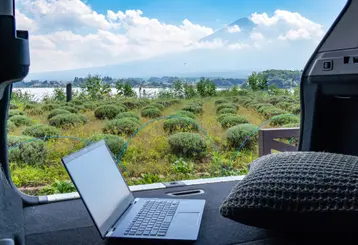Your Guide to Hiring Remote Workers From Other Countries

Table of contents
- 1.8 common questions about hiring remote workers in other countries
- 2.Does an international remote worker need a visa?
- 3.Can U.S. companies legally hire foreigners living in other countries?
- 4.Does U.S. employment law apply to employees in other countries?
- 5.Should you allow your employee to work remotely from a foreign country?
- 6.What are the risks of employing a foreign worker in another country?
- 7.How can you vet remote international workers?
- 8.Do you need special tax paperwork?
- 9.How and how much can you pay international workers?
- 10.Should you use a hiring platform?
- 11.Hiring independent contractors 101
While nearly 60% of the workforce in the United States is remote, 18% of global talent work remotely. And that number is growing, rapidly. For many HR teams and small business owners, the dramatic increase in the remote workforce highlights the possibility of onboarding overseas employees or contractors. After all, if you can find a talented worker that meets your needs and your budget, who cares if they live in New York or Kolkata? The problem is that remote work in the U.S. can get messy already, as individual states apply their own employment law. It can seem daunting to bring on a foreign employee or freelancer, even for a week-long project. The good news is that hiring remote employees, even those overseas, doesn't have to be difficult or time consuming.
8 common questions about hiring remote workers in other countries
Before anything else, it's important to decide whether or not you want to hire a foreign employee or an independent contractor. In most cases, it's common to hire a contractor for a short-term project on or on an annual basis. For example, the marketing department may need a designer or copyright. Or, in the case of technology startups, the developers may need an extra hand to finish a feature by the next deadline. Either way, determining their classification will make it easier to understand what you need to hire international talent.
1. Does an international remote worker need a visa?
The short answer: No. If you plan to hire an international talent as an independent contractor, then there is no need to sponsor an H-1B visa. However, you plan to hire a foreign worker on a full-time basis and want them to eventually work in your U.S.-based office, you will need to apply for an H-1B visa.
2. Can U.S. companies legally hire foreigners living in other countries?
Both the U.S. government and the remote worker's local government may have differing worker classification laws.
Yes, you can! There's some additional paperwork that you may have to collect. But hiring remote workers from other countries is perfectly legal. However, there are a few key considerations you'll want to take into account. First, are you hiring an independent contractor or an employee? Both the U.S. government and the remote worker's local government may have differing worker classification laws. In most cases, the freelance designation is fairly straightforward. So long as your remote contractor works on their own schedule, and has several clients, you are probably in the clear. But if either government determines that your remote worker is actually a full-time employee in a misclassification lawsuit, you may be on the hook for tax withholdings, wages, and benefits. However, it's important to note that this is true regardless of where your employee works or their citizenship. A remote employee in the U.S. could also file a lawsuit, and the penalties would be the same.
3. Does U.S. employment law apply to employees in other countries?
No, U.S. employment laws will not apply outside of the U.S. However, your foreign worker may be legally bound by a contract to honor company policies.
4. Should you allow your employee to work remotely from a foreign country?
In contrast, you may have local employees who want to work abroad. This can have different legal ramifications. If you are sending a full-time employee to an international office, you will need to coordinate with the local team and perhaps an expat agency to arrange visas, housing, and company onboarding. However, if you are hiring remote talent, this may be different. For example, some workers already have a long-term visa in another country, which allows them to work. Others could be planning to apply for "Freelance" visas, which exist in some countries like Greece and Germany. Many digital nomads prefer to work on tourist visas and country hop, which is in a legal grey area. While you may not be liable in case they are caught for violating their visa, you will need to decide whether or not that is a risk you are willing to take.Many digital nomads prefer to work on tourist visas and country hop, which is in a legal grey area.
5. What are the risks of employing a foreign worker in another country?
When it comes to hiring talent from a foreign country, you can target talent, reduce employee costs, and potentially increase productivity. But that isn't to say there aren't any risks to hiring international remote workers. Here are some of the top risks:
- Potential registration Some countries require organizations to register with the local tax entity, especially if you are hiring full-time employees.
- Costs Hiring remote talent isn't necessarily "cheap". Even if you don't have to pay benefits and withhold taxes for an independent contractor, many quality foreign workers charge similar rates to those in the U.S. English-speaking professionals in places like Malaysia, India, Singapore, and Brazil often face higher inflation and costs. And as many remote workers believe, geography should have little to do with payscales, which is reliant on talent.
- Management While there are many amazing tools today, working across various time zones can get exhausting for both parties. And while ideally your remote worker is a self-starter and offers regular updates, not every remote talent has self-management skills.
- Quality control If your foreign employee worked with a U.S-based company before, they may have different expectations of what is acceptable. The most common offender tends to be plagiarism, as many countries have lax intellectual property laws.
- Company culture A foreign employee often needs to work with a larger remote team. If the individual worker doesn't communicate or has problems with understanding company culture, this can slow down work and make management more difficult.
6. How can you vet remote international workers?
On the plus side, there are easy ways to weed out candidates and find the right remote candidate, whether they live at home or abroad. Generally speaking, you'll want to:
- Look at whether or not they have an independent, professional website.
- Look at whether they have worked with U.S.-based clients in the past.
- Review their LinkedIn page for testimonials and work experiences.
- Inspect their portfolio.
- Get on a brief, 15-minute call.
- Offer a paid test to check their skills and problem-solving abilities.
7. Do you need special tax paperwork?
Yes. Since a foreign worker is not required to pay U.S. taxes, you will need to file a W-8BEN with the IRS. However, if your remote talent has an EIN or ITIN, which they can apply for if they register their freelancing business in the US, you can simply send a W-9.
8. How and how much can you pay international workers?
Ask yourself whether choosing to hire an international worker is based on looking for talent or trying to reduce employment costs.
There are several ways to pay your remote employees in another country. Some of these include:
- Wire transfer
- PayPal
- Stripe
Should you use a hiring platform?
There are some hiring platforms, such as Upwork, Freelancer, and others that take care of a lot of the paperwork, payment, and other aspects of hiring for you. While it's often convenient, it's important to note that freelancers on these platforms take a 20%-30% pay cut for each project under a certain amount. Some hiring platforms even require freelancers to pay to connect with clients. For that reason alone, many freelancers on these platforms are moonlighters or are new to the industry. It's important to consider that if you pay bottom-of-the-barrel rates, you may find yourself with low-quality work — work that someone else may have to redo later on.
Hiring independent contractors 101
Whether you decide to hire remote contractors domestically or abroad, you’ll still need a way to evaluate and manage your new workers. With the majority of workers likely to be freelancing, or at least working from home, by 2027, independent contractors are here to stay. For a cheatsheet on hiring contractors and management best practices, check out our nifty Guide for Hiring and Managing Freelancers for HR Directors.

Kelsey Rae Banerjee
Table of contents
- 1.8 common questions about hiring remote workers in other countries
- 2.Does an international remote worker need a visa?
- 3.Can U.S. companies legally hire foreigners living in other countries?
- 4.Does U.S. employment law apply to employees in other countries?
- 5.Should you allow your employee to work remotely from a foreign country?
- 6.What are the risks of employing a foreign worker in another country?
- 7.How can you vet remote international workers?
- 8.Do you need special tax paperwork?
- 9.How and how much can you pay international workers?
- 10.Should you use a hiring platform?
- 11.Hiring independent contractors 101






